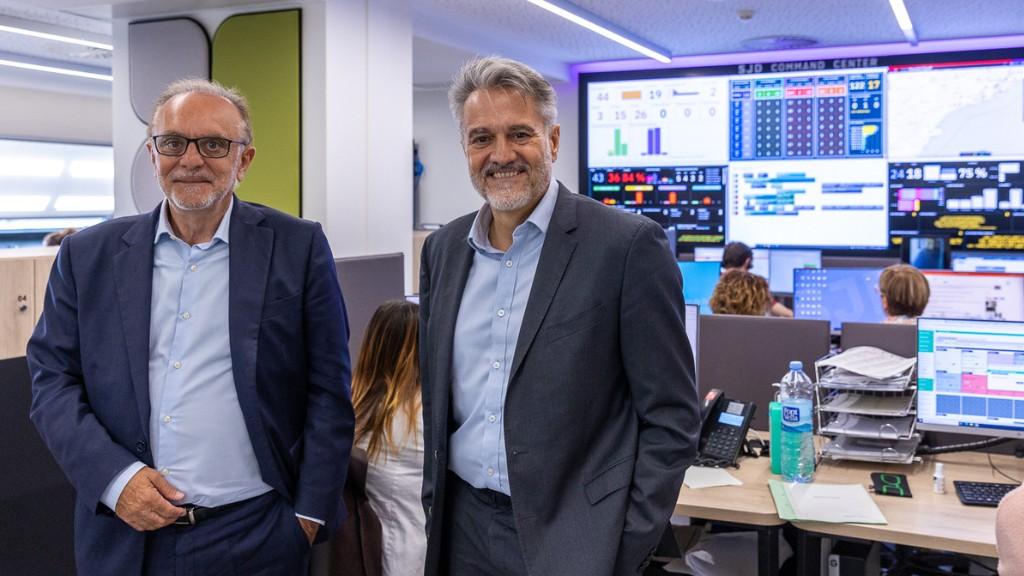SJD Barcelona Children's Hospital and Microsoft are collaborating on the creation of an AI laboratory for the development of digital health projects

The collaboration agreement envisages identifying and evaluating the creation of solutions for the benefit of patients and healthcare professionals and boosting research with artificial intelligence (AI) and Generative AI.
SJD Barcelona Children's Hospital has signed a collaboration agreement with Microsoft to evaluate the implementation of research, development, and innovation projects concerning the application of artificial intelligence (AI) and Generative AI in the field of health.
The agreement, signed by Manel del Castillo, managing director of the Hospital, and Alberto Granados, president of Microsoft Spain, seeks to boost innovation in the health sector through the application of cutting-edge technologies such as AI, improve patient care as well as accelerate medical research to promote prevention, diagnosis and treatment of diseases.
In the words of Manel del Castillo, ‘generative artificial intelligence is an unstoppable trend and our hospital is beginning to explore it for the benefit of patients, professionals and the healthcare system, always following ethical, safety and best practice criteria.’ In this sense, it should be noted that the hospital has created a multidisciplinary committee to ensure the responsible use of Generative AI.
Alberto Granados notes that ‘by signing this agreement, we will work with SJD Barcelona Children's Hospital to identify joint projects where the use of AI and Generative AI help health professionals make more precise diagnoses and treatment plans, in addition to promoting more predictive and proactive healthcare by developing better preventive care recommendations for patients. We make our offer of responsible AI that respects the privacy and security of patient data available to you.’
Innovation and research programmes powered by Generative AI
Since the beginning of 2023, the Spanish Federation of Rare Diseases (FEDER) and SJD Barcelona Children's Hospital are promoting the Únicas initiative, a network of healthcare centres led by the Ministry of Health in which 28 hospitals, research centres and FEDER have united to improve the care of pediatric patients with rare diseases. Precisely the Únicas network could benefit from the agreement with Microsoft, based on the Generative AI-related proofs of concept that have been explored in SJD Barcelona Children's Hospital.
Education is also part of this collaboration agreement, as SJD Barcelona Children's Hospital will be able to include patient support tools equipped with AI to optimise the capacities of the Escuela de Salud (School of Health) platform, a benchmark project in health promotion and education. The School aims to provide health professionals with tools to assist in the education and training of patients and thus enhance the fostering of healthy habits and the awareness among the population of the most relevant maternity and child healthcare issues.
Laboratory of AI projects applied to the health sector
Thanks to the agreement, professionals from Microsoft and SJD Barcelona Children's Hospital will collaborate in the development of the Health Copilot Lab concept, a laboratory for AI projects applied to the health sector, with the idea of proposing different experiences for its use. The possibility of incorporating it into the Command Center that the hospital already has in operation and which is committed to the digitisation of healthcare is being looked at, for example. This is a control centre where a team of professionals access and evaluate a large volume of key data on the centre’s operation in real-time in order to regulate the flow of patients and improve hospital management. The incorporation of AI projects at this control centre can further enhance the overall and real-time view of what is happening at all times, which can help in making the timeliest decisions to manage beds and resources in the best possible way and, thus, avoid saturations and bottlenecks, directly improving the patient experience.
In addition, these kinds of AI application initiatives will be included in some of the hospital’s scientific research projects.
Improving patient care is also key to the agreement. Among other initiatives, introducing interaction models with the patient to provide responses adapted to their needs with the help of artificial intelligence, always under human supervision, is expected. The project to automate coding within the framework of rare diseases and phenotypic coding is also interesting.
All projects will be underpinned by the stringent principles of responsible use of artificial intelligence offered by Microsoft, which is committed to the privacy, security, and data sovereignty of its customers through its EU Data Boundary initiative. This one-of-a-kind initiative is the result of a global re-engineering programme that ensures that the data of customers using Microsoft’s Cloud services (Microsoft Azure, Microsoft 365, Dynamics 365, and Power Platform) are kept and processed within the European Union. These data retention and processing commitments, defined in the EU Data Boundary, are at service-level and contractually backed, thus ensuring digital sovereignty in the health domains, in this case, for each of the services offered in the Microsoft cloud.



